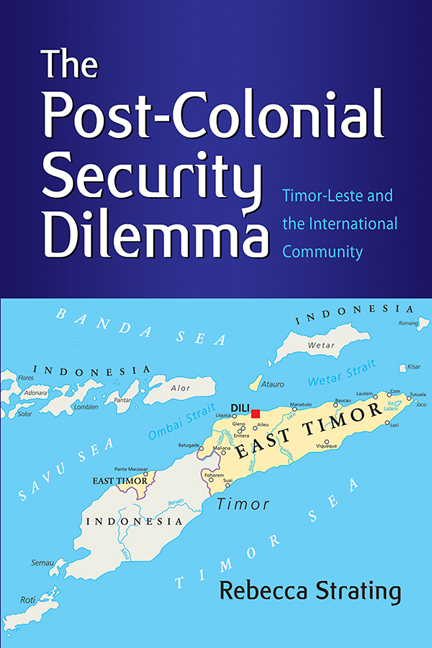Book contents
- Frontmatter
- Contents
- List of Tables
- Acknowledgements
- 1 Introduction
- 2 The Struggle for Recognition: Territorialization, Self-determination and the Imagining of “East Timor”
- 3 The Politics of Recognition: East Timor and the International Community
- 4 Establishing Legitimacy: International State-building in East Timor
- 5 Timor-Leste's Aspirational Foreign Policy
- 6 Identity Hedging: Timor-Leste's Engagement with Intergovernmental Organizations
- 7 Timor-Leste's National Security Agenda
- 8 Securing Economic Sovereignty
- 9 International Reconciliation and Transitional Justice
- 10 Conclusion: Timor-Leste in the Changing Regional Order
- Postscript
- Bibliography
- Index
- About the Author
4 - Establishing Legitimacy: International State-building in East Timor
Published online by Cambridge University Press: 16 May 2019
- Frontmatter
- Contents
- List of Tables
- Acknowledgements
- 1 Introduction
- 2 The Struggle for Recognition: Territorialization, Self-determination and the Imagining of “East Timor”
- 3 The Politics of Recognition: East Timor and the International Community
- 4 Establishing Legitimacy: International State-building in East Timor
- 5 Timor-Leste's Aspirational Foreign Policy
- 6 Identity Hedging: Timor-Leste's Engagement with Intergovernmental Organizations
- 7 Timor-Leste's National Security Agenda
- 8 Securing Economic Sovereignty
- 9 International Reconciliation and Transitional Justice
- 10 Conclusion: Timor-Leste in the Changing Regional Order
- Postscript
- Bibliography
- Index
- About the Author
Summary
This chapter examines the period of international state-building that Timor-Leste underwent prior to achieving political independence. While Indonesia had provided some education, schools and roads over the twenty-four years of occupation — which it sought to contrast with the neglectful Portuguese administration — the ability of East Timor to function as an autonomous state after the popular consultation was severely limited. Political, economic and social realities would render it impossible for Timor-Leste to establish governance structures and rule of law across the territory without extensive international assistance. While East Timor was not necessarily a “blank slate”, it faced significant challenges: the legal system had to be rebuilt virtually from scratch, there was an absence of administrative experience as the public service had consisted of mainly Indonesian personnel who fled after the 1999 ballot and the formal economy was underdeveloped.
While previous chapters discussed international processes of recognition, this chapter examines the ways in which East Timor's sovereignty became contingent upon developing a functional liberaldemocratic state. It examines the role of international state-building in East Timor from 1999–2002, focusing on the International Force for East Timor (INTERFET) and the United Nations Administration in East Timor (UNTAET). East Timor's experiences with international state-building reflected a desire on behalf of key members in the international community to shape the identity of the new state and develop effective governance structures and capacities. There were several state-building goals in East Timor. The first was to establish “empirical sovereignty”, which, as mentioned in the introduction, entails the capacities of states to establish political order and security within a territorial jurisdiction and provide their population “civil and socio-economic goods”. The second was to transform East Timor into a liberal-democratic state. These two goals are not necessarily compatible as liberal peace-building interventions have often struggled to build the conditions for democracy to take hold in societies unused to democratic rule. Nevertheless, the international state-building demonstrates that political recognition of East Timor's state sovereignty was conditional on the establishment of liberaldemocratic institutions.
New states enter an international community with pre-existing normative frameworks with which they are expected to conform. The preferences of industrially-dominant developed states shape the norms that structure behaviours within the international community and influence the expectations of new states regarding the nature of legitimate statehood.
- Type
- Chapter
- Information
- The Post-Colonial Security DilemmaTimor-Leste and the International Community, pp. 95 - 122Publisher: ISEAS–Yusof Ishak InstitutePrint publication year: 2018

